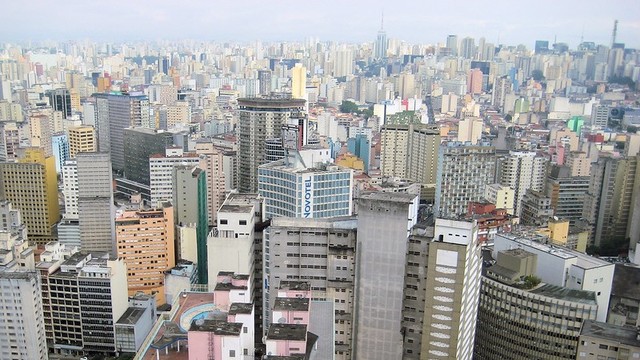Cash transfers in urban crises: do they work for women?
Twenty months on from the earthquakes in Nepal, new research will examine whether cash transfers are helping women to participate in, and contribute to, the Kathmandu Valley's local economy.


Temporary settlements in Kirtipur, Nepal, which was devastated by earthquakes in 2015 (Photo: Copyright Zahrah Nesbitt-Ahmed)
Our research began in Kirtipur – an ancient city 5km south-west of Kathmandu – in a local community centre. Thirteen women were sharing their day-to-day experiences since the devastating earthquakes that struck Nepal in April and May of 2015.
To support earthquake victims, the Nepali government and international non-governmental organisations (INGOs) set up emergency cash transfer programmes. These are regular payments of money, or vouchers for goods or services, provided to individuals or households instead of or in addition to other types of in-kind humanitarian aid (e.g. food, seeds, and tools).
By putting money directly into the hands of those affected, individuals or families can decide how to meet their food and non-food needs.
Empowering women
Cash transfers can also empower women economically (PDF), enabling them to increase their incomes and own assets, such as land or property. Assets can also be used as collateral to access credit.
Beyond the financial aspects, having direct access to, and control over, cash can strengthen women's decision-making − for example determining how resources are allocated within the household. This can in turn enhance their self-esteem.
After the earthquake, we wanted to find out if humanitarian cash transfers were supporting women's economic empowerment in Kirtipur.
Struggling to recover
The women showed us the temporary shelters many families were living in. On the streets, people were clearing debris and rubble while others gathered bricks and iron sheets for rebuilding homes.
We heard how a strong sense of community was helping people slowly put their lives back together. Nonetheless, almost 20 months after the first earthquake, the physical impact on Kirtipur was still clearly visible.
Livelihoods: over a million women and girls affected
Beyond the physical destruction, the earthquake had devastating effects on local livelihoods, particularly for those women and girls whose incomes are heavily dependent on informal home-based work: when homes are reduced to rubble, paid home-based work disappears.
Shortages of gas, fuel and medicine also made jobs most commonly carried out by women − such as domestic and caring responsibilities − more strenuous and hazardous (PDF).
Incorporating gender into crises response
Evidence shows how efforts to incorporate gender equality into broader development policy can help secure fairer access to jobs and education, and tackle issues such as unpaid care work, which is often overlooked.
But we also need to advance gender equality in humanitarian responses – as set out in the Sendai Framework for Disaster Risk Reduction (2015), the Sustainable Development Goals (2015), and a host of UN Security Council resolutions on women, peace and security.
Our research will examine the impact of the cash and voucher aid programme set up by the Nepali government and other humanitarian agencies. Have they increased women's employment opportunities? Have they helped women increase their decision-making within the household and increase their influence in the wider community?
Why focus on cash in urban contexts?
Cash-based urban economies have a very distinctive gendered dimension, with poor women and girls often engaged in low-paid, poor-quality formal work, for example in the garment industry, and informal work, such as paid domestic work.
This, alongside large amounts of unpaid work, including cleaning, cooking, and caring for children, the sick and the elderly, means women bear the brunt of a highly unequal labour market.

Cash and voucher aid programmes in urban humanitarian contexts can support households when crises hit, providing basic services such as water, sanitation and healthcare.
What's still unclear, and what our research will explore, is how cash transfers in these contexts can empower women to engage in and contribute to the economy over the longer term.
A number of INGOs in Kirtipur have implemented cash for work programmes, providing payment for work such as clearing rubble and debris.
Has this income stream enabled them to access credit and other assets? Do women decide how the income is spent? Do these programmes include skills training? And do they consider women's unpaid domestic and household responsibilities, and offer flexible working times so that women can manage paid and unpaid work?
What we will be doing?
Our research will examine the day-to-day activities of women and their families, including paid and unpaid care work post-earthquake. Overall we will assess if and how cash transfers are strengthening women's role in the economy.
We will carry out:
- Interviews with women who have received emergency cash transfers from the state, INGOs or both – and those that haven't
- Focus group discussions with other men and women in the community, and
- Key informant interviews with humanitarian programme staff.
Through our research with the women and their families in the Kathmandu Valley, still struggling to piece together their lives 20 months on, we hope to build an understanding of how humanitarian organisations can better implement cash transfer programmes in urban areas – particularly in terms of strengthening women's contribution to the economy.
We look forward to sharing our findings in the coming months.
Dr Zahrah Nesbitt-Ahmed (zahrah@sddirect.org.uk) is a technical specialist on women's economic empowerment at Social Development Direct. The project, 'Impacts of humanitarian cash and voucher aid on women's economic empowerment in Kathmandu Valley', is a collaboration between SDDirect and the Nepal Peacebuilding Initiative (NPI).
About the author




